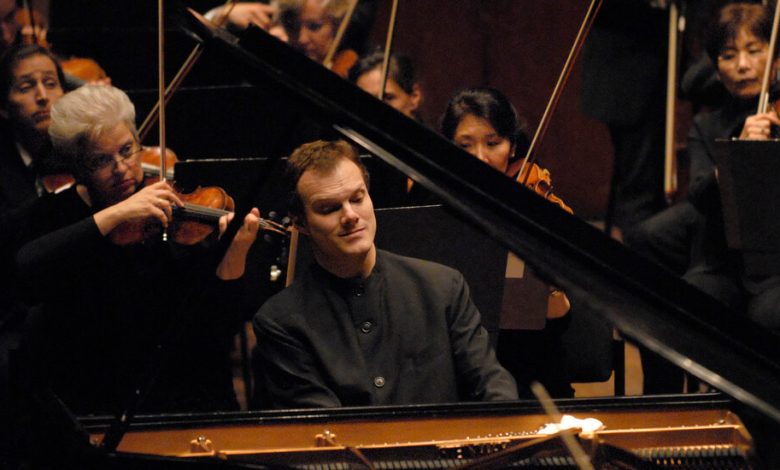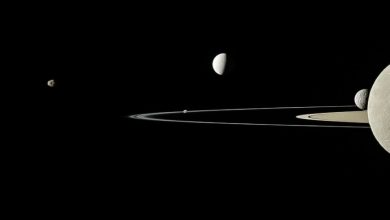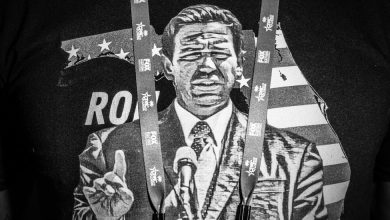Lars Vogt, Acclaimed Pianist and Conductor, Is Dead at 51

Lars Vogt, a sensitive, communicative pianist whose warmth as a collaborator made him an outstanding chamber musician and a conductor of growing stature, died on Monday at a clinic in Erlangen, Germany. He was 51.
His manager, Celia Willis, said the cause was esophageal cancer, which Mr. Vogt had learned he had in March 2021. He had spoken frankly about his prospects while continuing to perform, up until a few weeks before his death.
“Music is just such an amazing thing. I find that even more in these times, when I spend a lot of time in hospitals and with doctors, and of course wondering how things are going to go,” Mr. Vogt said in an online interview with the pianist Zsolt Bognar in July, “and yet in music you get transported into this world where you forget everything.”
Mr. Vogt created and shared those worlds in sublimely free, quite personal detail, and he had little interest in show for the sake of show. His was a “loving” approach to the piano, he told Pianist magazine in 2016, one that tried “to get the sound out of the keyboard, rather than into it.”
If the results could sometimes seem idiosyncratic, at his best he played with “a sense of perfect equilibrium, a balance of lines that sounded simple and natural, but could only have been the result of thoughtful calibration,” as Allan Kozinn of The New York Times wrote in a review of a recital in 2006.
Technique for Mr. Vogt was a means to expression, not an end in itself. He avoided repertoire that called for mere virtuosity — he once recorded an album of pieces written for children — and he eventually unburdened himself of the pressure placed on pianists to memorize the works they learn, so he could perform without the nervousness he had long felt onstage.
He took the time to involve himself deeply in the works he played solo, which came mostly from the high Germanic tradition — ranging from Bach, whose “Goldberg” Variations he recorded to acclaim, to contemporary composers like Thomas Larcher. It was the music of Brahms, however, that was always closest to Mr. Vogt, for the solace of its melancholy.
Mr. Vogt’s last public appearances, in which he played Brahms, were in June at Spannungen, a chamber music festival that he founded in 1998 that takes place in an Art Nouveau hydroelectric power plant in Heimbach, Germany. (Its name translates to “Voltages” as well as “Tensions.”) And it was in chamber music that he excelled, especially with the violinist Christian Tetzlaff and his sister, the cellist Tanya Tetzlaff.
Mr. Vogt recorded Brahms and Dvorak with the Tetzlaffs as a trio and, with Mr. Tetzlaff, set down fervently expressive accounts of violin sonatas by Mozart, Schumann and Brahms. Those exquisite recordings, made for the Ondine label, were widely judged worthy of reference status not because they aimed to be a final word on the works involved, or even appeared to be, but because the audible generosity of their partnership made for a unique focus and intensity.
“This is chamber-playing at its most humane,” the critic Richard Bratby wrote of their recording of Beethoven’s Opus 30 sonatas in Gramophone last year, “impossible to hear without feeling a renewed love and admiration for music and performers alike.”
It was also as an avowed collaborator, rather than as a more forceful leader, that Mr. Vogt took on conducting, which he decided to explore after stepping in at short notice to lead Beethoven from the keyboard with the Camerata Salzburg early in the 2010s.
“There was no conductor, just a very good concertmaster, and it was so much fun, so easy,” he recalled of that concert in an interview with Gramophone magazine in 2017. “I rang my agent afterwards from the taxi to the airport and said, ‘I need to know how far I can go with this. It doesn’t matter which orchestra it’s with, I just love it so much.’”
Hired after a single concert, Mr. Vogt became the music director of the Royal Northern Sinfonia, based in Newcastle, England, in 2015; together, they recorded the Beethoven concertos with a sparkling pliancy and the Brahms with an unusual tenderness of touch. He took the same post with the Chamber Orchestra of Paris in 2020 and remained there until his death.
Conducting is “like chamber music,” Mr. Vogt told Gramophone. “I want to encourage the character of the music, encourage people to go to their limits of expression, and ideally get them to the state that they want to do that, enjoy searching to the depths.”
Lars Vogt was born on Sept. 8, 1970, in Düren, near Cologne, the third child of Marie-Luise Vogt, a secretary, and Paul Vogt, an engineer who also played soccer to a high standard. He and his siblings learned music as just one of many youthful activities, soccer included.
But Mr. Vogt’s first piano teacher saw promise soon after he had started at age 6. He won a national competition for young musicians at 14, and at the same time began studying with the renowned pedagogue Karl-Heinz Kämmerling at the Hanover University of Music and Drama (now the Hanover University of Music, Drama and Media). Their lessons continued informally until Mr. Kämmerling died in 2012, when Mr. Vogt succeeded his teacher as professor of piano at that university.
Suitably firmed up technically under Mr. Kämmerling’s demanding tutelage, Mr. Vogt took second prize at the Leeds International Piano Competition in 1990. That experience proved as important for the personal relationships it brought as for the international tours that followed.
On the podium during the Leeds final for Mr. Vogt’s intelligent if introverted reading of the Schumann Piano Concerto was the English maestro Simon Rattle; their partnership became one of the many friendships through which the pianist thrived musically, not least during a stint in the 2003-4 season as the pianist in residence at the Berlin Philharmonic, which Mr. Rattle then led.
Mr. Rattle also planted the seeds that bloomed into Mr. Vogt’s podium career. He told him after a joint appearance with the Los Angeles Philharmonic at the Hollywood Bowl in 1991 — an American debut in which the pianist “exercised his command with personality and poise” in Beethoven, John Henken wrote in The Los Angeles Times — that he would be a conductor within a decade.
That comment “hit me like a lightning bolt, because I’d never thought of it,” Mr. Vogt told The Scotsman in 2015. “I guess he noticed how curiously I observed what he was doing. I was fascinated at what miracles can be achieved by something that doesn’t — ideally — produce any sound.”
Mr. Vogt’s first marriage, to the composer Tatjana Komarova, ended in divorce. He married the violinist Anna Reszniak, the concertmaster of the Nuremberg Symphony Orchestra, in 2017. She survives him, as do his parents; his siblings, Karsten Vogt and Ilka Fischboeck; and his daughters, Emma Vogt, Charlotte Kuehn and Isabelle Vogt, an actress with whom he recorded melodramas by Schumann and Strauss.
“He was at once the wildest and most sensitive musician I know,” Mr. Tetzlaff, who performed with Mr. Vogt for 26 years and considered him his “closest comrade,” said of the pianist in an interview with Van magazine shortly after Mr. Vogt’s death.
“I’ve met a lot of musicians who have become very successful by talking about themselves, presenting themselves well, and who seem to have no experience with doubt,” Mr. Tetzlaff went on. “But I learned that music can only speak fully in freedom and love. It’s a thing you only experience with very few musicians, artists like Lars.”





